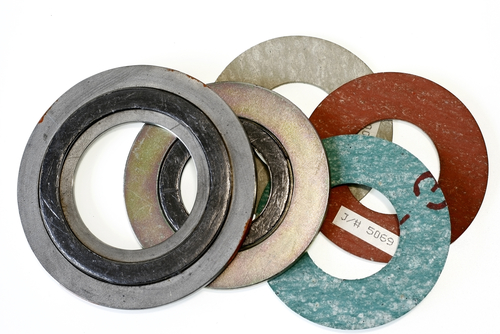Gaskets play a huge role in our everyday lives. They are the heart of everything from appliances, engines and more. Gaskets work to prevent the escape of air, water, gas and many other fluids in every commercial and industrial situation imaginable.
Because they are significant in the proper operation of a wide variety of products and machines, the selection of the right gasket for a particular application is crucial in the overall design. This article will take a closer look at how to choose the perfect gasket for your needs.
Know the Configuration of Flange Gaskets and Their Applications
The majority of gasket failures happen when uneven pressures on mating surfaces, stress relaxation and loss of torque on securing bolts, and temperature is not addressed. As a result, before you consult an expert to choose the proper gasket, you need to know every detail about the gasket’s future environment, including temperature, fluid pressure and the corrosive properties of the contained fluid. Once you have these, you can move on to choosing the proper material and shape.
Focus on Material Selection
Once the overall environment of where the gasket will be functioning has been determined, material selection is next. Here are the four common materials used in gasket manufacturing and few benefits of each.
Elastomeric
- In-compressible, extensible, impermeable and elastic
- Can be deformed but never reduced in volume
- Made of various materials including CP, EP, IIR, neoprene and natural rubber
Fibrous
- Various different types all with unique properties including:
- Carbon Fiber
- MMMF
- Glass
- Mica
- Cork
- PTFE (Teflon)
Soft or Non-Metallic
- Easily compressed under a low bolt load
- Used in pipe flanges, heat exchangers and compressor valve gaskets
- Very tolerant to abuse and forgiving
Metallic
- Made from a single metal or combination of metallic materials in a variety of shapes and sizes
- Great for high temperature and pressure applications
Evaluating Chemical Resistance
Before you select from the materials mentioned above, it is essential to understand the level of chemical resistance your gasket will require. The corrosive properties of the contained fluid play a significant role in your selection. For instance, Nitrile rubber NBR, is fairly resistance to oil but unsatisfactory for use with oxidizing fluids. However, ePTFE is great for all media in the 0-14 pH range, but cannot handle molten alkali metals and elemental fluorine. While this may seem confusing to some, this is why it is crucial to have all the facts about where the gasket will fit into a specific application to correctly choose the right gasket.
Construction Factors (Non-Metallic, Metallic, Semi-Metallic)
We mentioned earlier on the difference of metallic and non-metallic (soft) gaskets. One brings significant strength, while the other is molds and shapes for your needs easier.
Testing for Gasket Performance
Accurate testing of gasket performance is crucial to make sure that a particular gasket will meet the parameters required for your application. Using tests like the hot compression test, creep relaxation testing and many more, makes it clear that a chosen gasket will withstand your project’s specific factors such as temperature, compression, pressure, seal-ability and resistance to chemical degradation.
Choosing the Right Gasket Manufacturer
If all of the above still seems a bit confusing or overwhelming, then this last tip will take a lot of your stress away. The gasket maker you select should never just sell you a gasket and walk away. Bryan Hose & Gasket takes great pride in matching the right gasket with the right project. Our highly experienced staff is always ready to assist our customers in selection and provide technical data so you are guaranteed to make the right decision. Contact us with the link below for more information!


Debra Wilson liked this on Facebook.
Charity Wilson liked this on Facebook.
Dan Wilson liked this on Facebook.
Bryan Hose & Gasket liked this on Facebook.
Butch Melton liked this on Facebook.
Lorenzo Reyes liked this on Facebook.
Lyn Allamon liked this on Facebook.
Honest X Honest liked this on Facebook.
Blanche Lyons liked this on Facebook.
Ricardo Cruz liked this on Facebook.